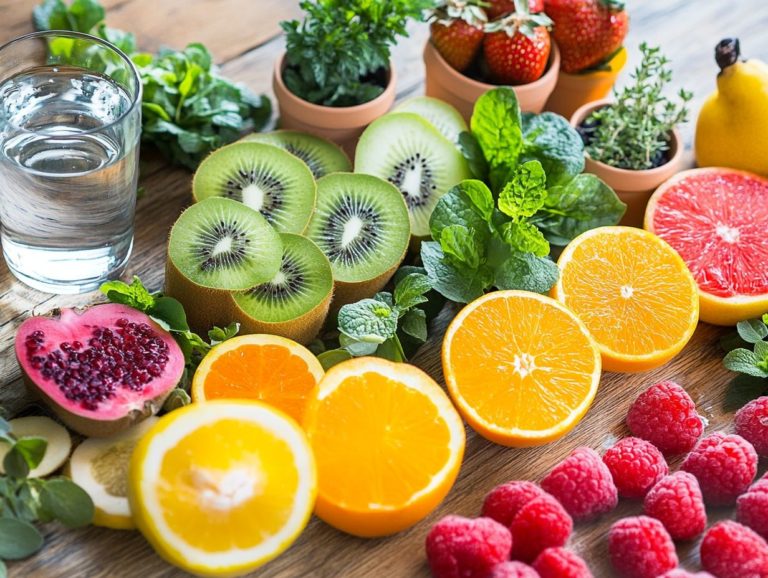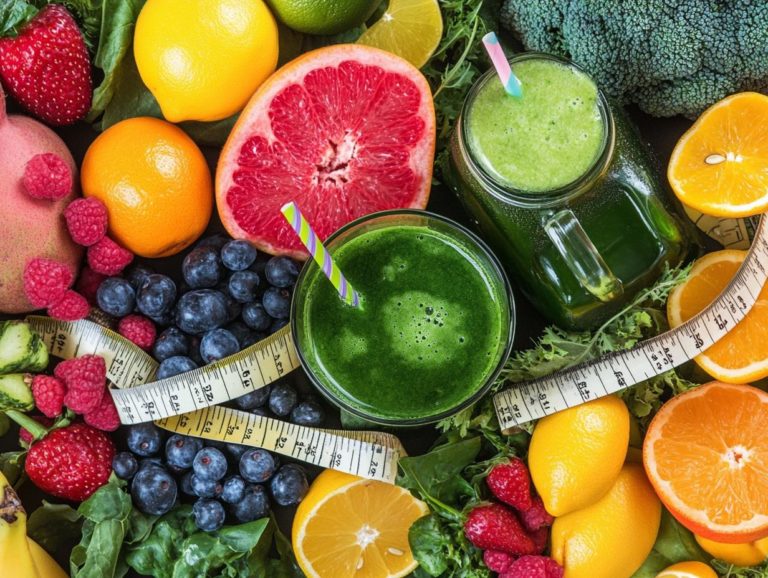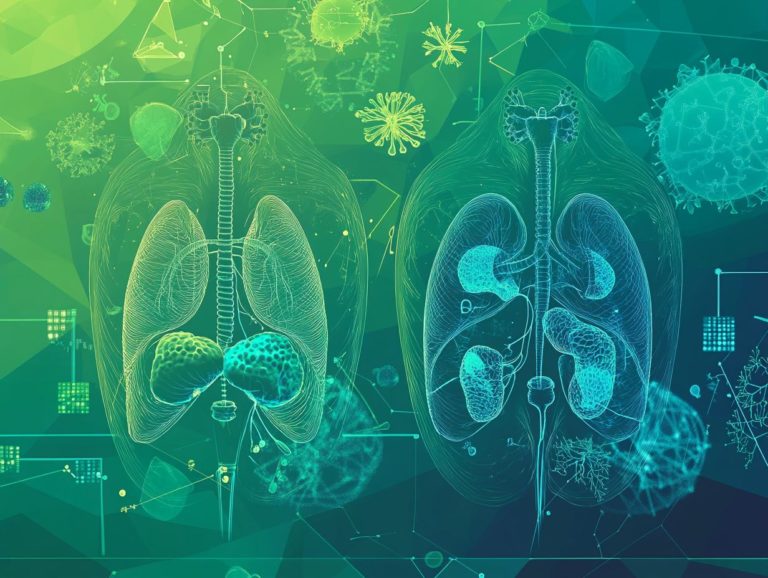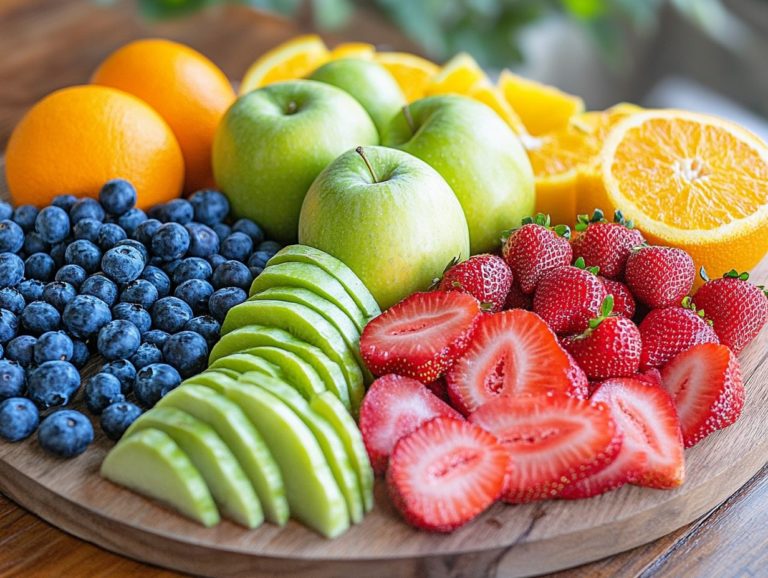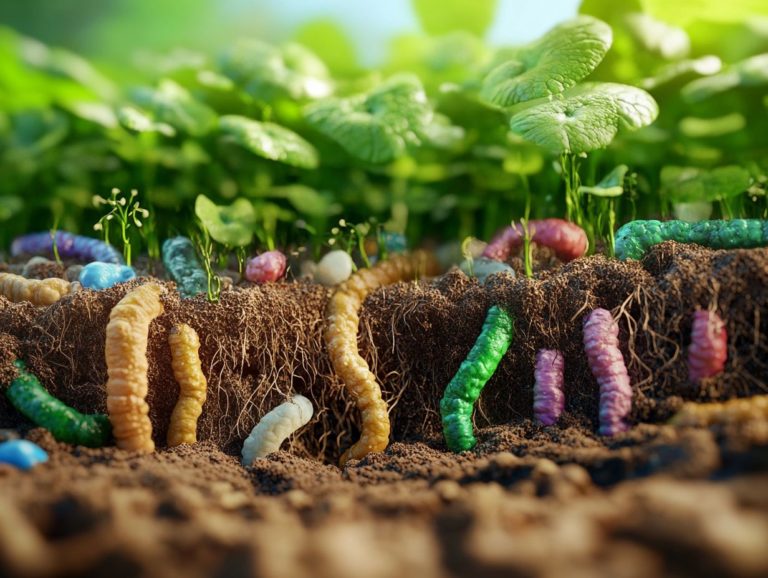Exploring Different Detox Diets
Curious about detox diets? You re certainly in good company. These trending eating regimens claim to cleanse your body and elevate your overall health. Don t miss out on the chance to rejuvenate your health!
But what exactly constitutes a detox diet? How do the various types function? From juice cleanses to raw food detoxes, each method offers distinct advantages and potential downsides.
This article will dissect the different detox diets. We will highlight their benefits, what to be cautious about, and how to select the most suitable option for you. Get ready to discover the intricacies of detoxing!
Contents
Key Takeaways:

- Detox diets are short-term plans to eliminate toxins from the body.
- They can offer benefits like weight loss but may also cause nutritional deficiencies.
- Consult a healthcare professional before starting a detox diet.
What is a Detox Diet?
A detox diet is a carefully crafted regimen aimed at helping your body eliminate toxins that accumulate from poor dietary choices, pollution, and unhealthy lifestyle habits. They often involve consuming specific foods, juices, or supplements that enhance your body s natural waste elimination processes.
Proponents assert that detox diets can improve digestion and boost energy levels while promoting overall well-being. It s essential to explore the science behind these claims and consider both the potential benefits and drawbacks.
Definition and Purpose
The primary aim of a detox diet is to support your body s natural processes for eliminating waste. This helps to eliminate harmful substances while promoting overall health.
By focusing on foods rich in nutrients like fruits, vegetables, and whole grains, you can enhance your liver’s ability to process and expel toxins. The liver plays a crucial role in metabolizing harmful compounds.
Your kidneys also filter waste products from your blood and excrete them through urine. This synergy highlights the rationale behind detox diets: they not only seek to purify your body but also aim to restore balance.
This approach can lead to better digestion, improved energy levels, and heightened immunity all thanks to proper hydration and nutrient intake.
Types of Detox Diets
You have a variety of detox diets at your disposal. Each presents a distinct method for cleansing your body of toxins and boosting overall well-being.
Options like juice cleanses, raw food detoxes, and the Master Cleanse are commonly explored pathways to rejuvenation.
Juice Cleanses
Juice cleanses entail consuming nothing but fresh fruit and vegetable juices for a designated period. This is designed to saturate your body with nutrients while aiding in the elimination of toxins.
Typically lasting between one to seven days, these cleanses showcase a delightful array of juices crafted from nutrient-packed vegetables like kale, spinach, and cucumbers, complemented by the sweetness of fruits such as apples, berries, and oranges.
Proponents of juice cleanses tout health benefits, including enhanced hydration and boosted energy levels. Many believe this cleansing process serves as a natural detox, supporting liver function and promoting overall well-being.
While scientific evidence may vary, participants often report feeling lighter and more revitalized after completing a cleanse. This only fuels the growing intrigue surrounding this dietary approach.
Raw Food Detox
A raw food detox invites you to embrace uncooked, unprocessed foods particularly a vibrant array of fruits, vegetables, nuts, and seeds to elevate your nutrient intake and antioxidant levels for enhanced health.
This approach focuses on a diet brimming with essential vitamins, minerals, and phytochemicals, which are vital for boosting your body’s natural detoxification processes. By championing nutrient-dense foods, proponents suggest that this lifestyle can effectively eliminate toxins, enhance metabolism, and elevate overall wellness.
Embarking on such a detox may present challenges. You might face the risk of nutrient deficiencies if not approached with care. Additionally, you may experience an adjustment period that could lead to temporary fatigue as your body acclimates.
However, incorporating a diverse selection of these natural foods can ultimately usher in a refreshed and revitalized system, abundant in antioxidants that combat oxidative stress the damage caused by free radicals in your body.
Master Cleanse
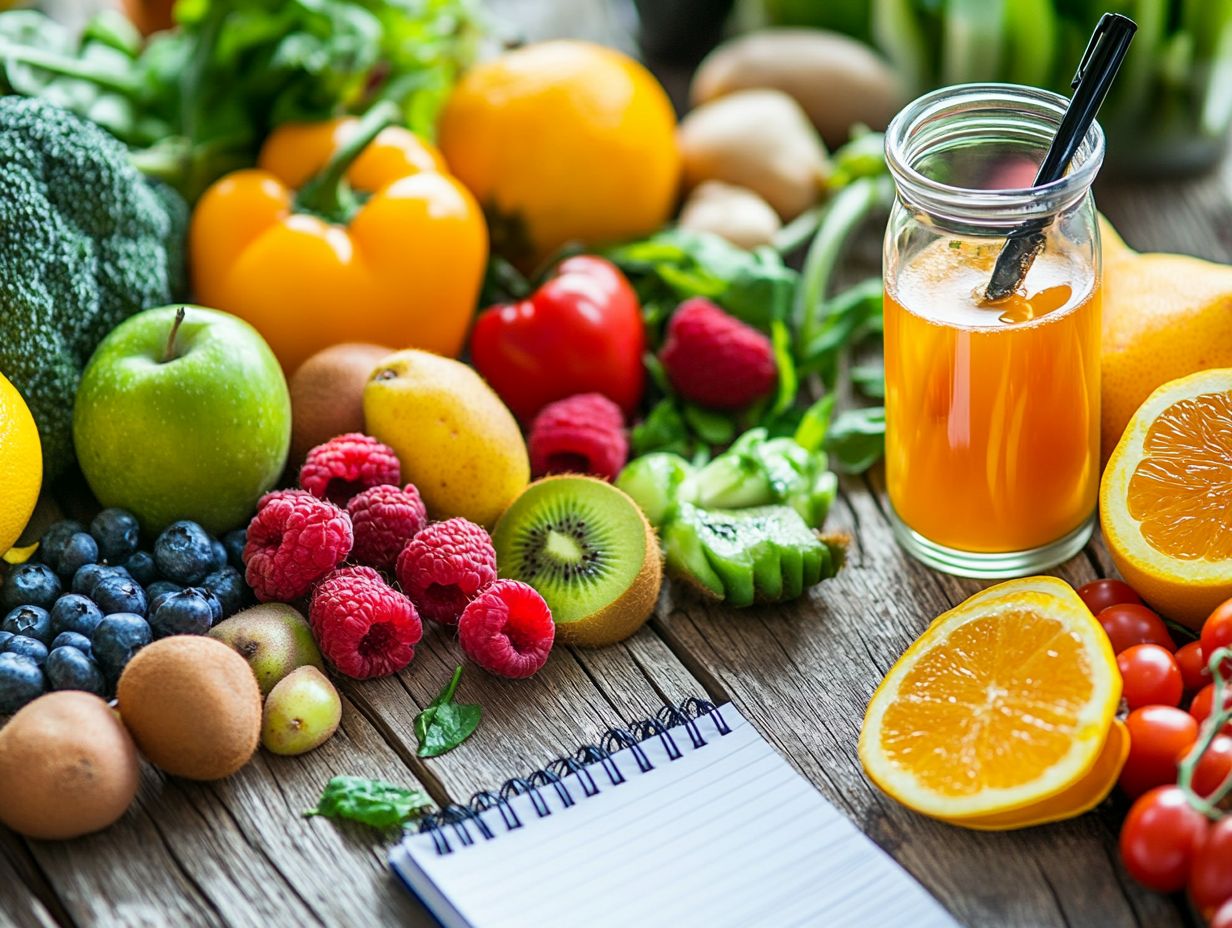
The Master Cleanse is a well-known detox regimen that immerses you in a liquid diet crafted from a special lemonade blend of lemon juice, cayenne pepper, and maple syrup. Its purpose? To cleanse your body while promoting weight loss.
This concoction is not merely a detox tool; it’s also believed to offer a range of health benefits, such as enhanced digestion and increased energy levels. Typically, this journey lasts for ten days, during which you’ll consume only this liquid and forgo solid foods. Many participants in the Master Cleanse report experiencing a revitalized sense of vitality and mental clarity.
However, it s important to consider the ongoing debates surrounding its overall effectiveness and safety. Critics raise valid concerns that such extreme dietary practices might lead to nutritional deficiencies and other health complications, urging you to contemplate a more balanced approach instead.
Potential Benefits of Detox Diets
Detox diets frequently come highly recommended for their range of potential benefits. You might experience weight loss, a boost in energy, improved digestion, and an overall enhancement of your health and well-being. Don’t miss out on the chance to feel revitalized!
Weight Loss
One of the primary motivations for embarking on detox diets is weight loss; many individuals believe these diets can help eliminate toxins and promote fat loss.
In this context, detox diets often advocate for a substantial reduction in calorie intake, which can indeed contribute to weight loss. By focusing on fruits, vegetables, and whole foods while limiting processed options, these diets can create a natural caloric deficit that works in your favor. Proponents argue that by ridding the body of toxins, you can enhance your overall metabolism, making fat burning more efficient.
However, it’s essential to recognize that not all detox diets are created equal. Some may lead to nutrient deficiencies or energy dips that could hinder your progress. This highlights the need for a balanced approach to weight management, ensuring that while you address toxins, your overall health and nutrition remain paramount.
Increase in Energy
Many advocates of detox diets assert that these diets can elevate your energy levels, thanks to enhanced nutrient absorption and the elimination of toxins from your body.
By embracing nutrient-dense foods like leafy greens, nuts, and seeds, you may improve your intake of essential vitamins and minerals, including B vitamins and magnesium, both important for energy production. B vitamins, for example, play a key role in converting carbohydrates into glucose, a crucial fuel source for your body. Meanwhile, magnesium helps regulate energy production, ensuring that your cellular processes work efficiently.
As your body becomes cleaner and more adept at processing nutrients, you might experience a notable boost in your overall vitality and stamina, giving you the power to engage more fully in your daily activities.
Potential Risks and Side Effects
Detox diets may be marketed as a pathway to wellness, but it’s crucial to be aware that they can carry potential risks and side effects. If not managed correctly, you might encounter nutritional deficiencies and various health complications that could undermine your well-being.
Nutritional Deficiencies
Nutritional deficiencies pose a significant concern when you embark on strict detox diets. These plans often limit essential vitamins, minerals, and nutrients vital for your overall health.
You may find yourself lacking B vitamins, which are crucial for energy metabolism and brain function. Low iron levels can lead to fatigue and a weakened immune system.
Similarly, the absence of calcium and vitamin D can jeopardize your bone strength. Inadequate fiber intake may disrupt your digestive health.
Thus, maintaining a balanced nutrition plan is paramount during any detox process. A well-rounded diet supports your body s natural detox pathways and bolsters your energy levels, enhances your mood, and promotes overall wellness.
This underscores the importance of mindful eating, even during cleansing phases. Juices and smoothies can provide additional nutrients.
Disordered Eating Patterns
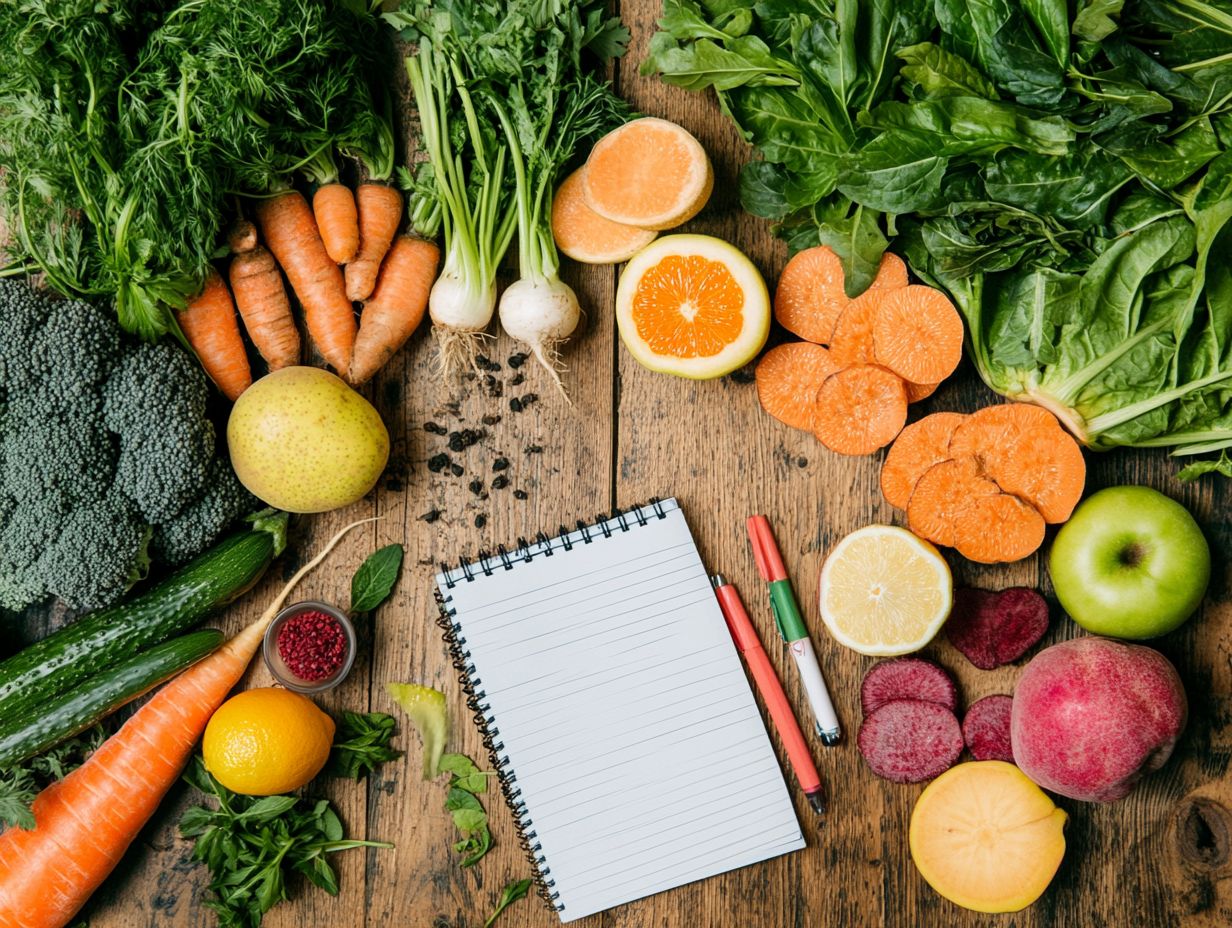
Engaging in strict detox diets can sometimes lead to disordered eating patterns. You might develop an unhealthy relationship with food through cycles of restriction and binging, largely influenced by claims made about juice cleanses and fad diets.
These restrictive practices can lead to an unhealthy obsession with food, often heightening your anxiety regarding food choices.
Over time, this preoccupation can manifest in behaviors such as binge eating or an obsession with calorie counting, especially when consuming processed foods and alcohol. This ultimately undermines your overall well-being.
The psychological effects of these extreme diets can surface as feelings of guilt and shame after indulging in foods outside the rigid regimen. This emotional turmoil impacts your mental health and can create barriers to maintaining a balanced and sustainable eating practice.
In such cases, the joy of food is overshadowed by stringent rules and relentless self-criticism, often compounded by unrealistic expectations regarding weight loss.
How to Choose a Detox Diet
Selecting the ideal detox diet involves knowing your personal health goals, lifestyle factors, and unique nutritional needs. This careful approach ensures that you embark on a safe and effective cleansing journey tailored for you.
Focus on the importance of hydration through ample water and green tea.
Factors to Consider
When selecting a detox diet, several critical factors are important, including your individual health conditions, dietary preferences, and nutritional requirements.
For instance, if you have pre-existing health issues like diabetes or hypertension, a tailored approach is essential. Ensure that the detox process supports your wellness journey rather than complicating it.
The level of your physical activity also plays a significant role. If you’re active, you’ll likely need a detox plan rich in proteins, healthy fats, and nutrients to keep your energy levels up.
Your love for plant-based foods, broccoli, or specific cuisines will further shape your choices. It’s vital that the selected detox method aligns not only with your health goals but also with your lifestyle and enjoyment of food.
Tips for a Safe and Effective Detox
Follow these simple steps for a great detox experience! Prioritize your health, thorough preparation, and diligent post-detox care. Be mindful of potential negative effects of extreme detox practices.
Preparation and Aftercare
Proper preparation and aftercare are vital for a successful detox diet. They help your body transition smoothly in and out of the detox phase and tackle issues like constipation.
Before starting your detox, educate yourself about supportive foods and beverages. Garlic and spinach are great choices, while some foods are best avoided.
Hydration is crucial! Drink plenty of water during and after your detox to flush out toxins.
After completing the detox, focus on aftercare. Gradually reintroduce solid foods to avoid shocking your digestive system.
A balanced diet of whole foods, especially fruits and vegetables, is key. This sustains the benefits you’ve achieved and keeps you hydrated for optimal well-being.
By following these steps, you can boost your overall health and vitality. Research from the Cleveland Clinic and the National Center for Complementary and Integrative Health supports these practices.
Frequently Asked Questions
What is a detox diet?

A detox diet is a short-term plan to remove toxins from your body. It promotes health and wellness by focusing on nutrients and supplements.
How does a detox diet work?
This diet involves cutting out certain foods, especially sugar and processed items. Instead, you will consume a mix of fruits, vegetables, and whole foods like broccoli and spinach to support natural detoxification.
Are there different types of detox diets?
Yes! Detox diets vary widely. You might encounter juice cleanses, raw food diets, or elimination diets targeting specific organs like the liver or kidneys.
What are the potential benefits of a detox diet?
A detox diet may improve digestion and boost energy levels. It could also help with weight loss and clear skin!
Are there any potential risks or side effects of a detox diet?
Some risks include nutrient deficiencies and fatigue, especially for those with pre-existing health issues. Consult a healthcare professional before starting any detox diet.
Do I need to do a detox diet regularly?
Not necessarily! Most people can maintain health without regular detoxes. However, adopting principles like eating whole foods and cutting out processed items can be beneficial for everyone.

